|
GOLDSEA |
ASIAN AMERICAN RAGS-TO-RICHES SAGAS
RICHES FROM RAGS
PAGE 2 OF 15
Mow is the proud architect of BBI's state-of-the-art paperless reporting
system. The system came about when he noticed foot-thick computer
printouts being sent each week to all the salesmen at a cost of $360,000 a
year in overnight express charges alone. An entire roomful of paper went to
feed the printer every week. In a company that turns over its inventory 60
times a year, such reports would be meaningless by the time they are
received after a full day of shipping has taken place. With laptops and
modems, not only are paper and express costs saved, but the salesmen know
precisely what is in inventory and how any item is selling at any store in the
country. Mow is confident that no other apparel company can make that
claim. Of such efficiencies is BBI built.
"Cutting cost--that's what it's all about," Mow says in a white-hot
whisper. In the restful and almost reverrent hush of his office the words
have a mystical resonance. As we talk I come to feel that Mow's office is a
temple to the god of efficiency, that the entire company is a complex,
far-flung system he has programmed to generate products, growth and
profits at a rate unheard of in any but the world's best companies. All that
without the phone ringing. Ponder that for a moment and you come to
understand why Mow is so proud of his quiet phone; it's the ultimate proof
that his system works.
It's hard to imagine a CEO better equipped to create and install that kind of
efficiency. Twenty years ago--another lifetime, to hear Mow tell it--he
founded Macrodata Corporation, a public company that gave birth to the
technology for designing and testing chips before there were chips to test. In
the 70s Bill Mow was the ultimate technologist, a fountainhead of metal-oxide
semiconductor technology at whose feet IBM and NEC sat for inspiration.
"I was the guru of the computer industry," Mow says, savoring a moment of
remembered glory before pushing the discussion back to more immediate
topics. Pushed, he concedes that An Wang's magnetic core memory was
probably a bigger conceptual breakthrough in the history of computer
technology, but maintains with some justification that Macrodata's large-scale
integration equipment had a far more lasting practical effect. Mow is still
proud of his technical wizardry. To most people he is Dr. Mow. That's how
his business card reads.
Mow speaks slowly and elliptically, tossing out words and phrases charged
with meaning. In eight hours I rarely hear a complete sentence with a
subject, verb and predicate. Sentences are inefficient, full of inessential
words. Mow chooses to impart the core thoughts and leave the logical
connections for the listener to make. At heart he is still a talented engineer, a
man who has cultivated the ability to put his ideas directly into productive
systems without having to articulate them for public consumption. And now,
owning 90% of Bugle Boy, a company he has founded and built with his own
guts and wits, he has absolutely no incentive to cultivate the gift of gab. Not
that he is a dull conversationalist. There is enough irony, color and profanity
to remind me that I am conversing with a brilliant innovator. He just doesn't
need to impress anyone.
Yet, he isn't imperious, crusty or smug. Partly because he seldom raises his
voice, partly because he enjoys the repose of a tycoon who is lord of all he
surveys, it's easy to feel relaxed with him. Mow's lack of pretension or
smugness, his utter lack of the need for pretension or smugness, the
directness of his expressions, is what gives him at times the demeanor of an
intelligent farmboy, belying his many years of worldly experience. Mow
himself says, "Who do I have to impress?"
PAGE 3
PAGE 1 |
2 |
3 |
4 |
5 |
6 |
7 |
8 |
9 |
10 |
11 |
12 |
13 |
14 |
15
|
|
|
|


Bill Mow is a sportscar nut and keeps several exotic beauties in a specially designed garage below his office suite. Here he poses with his Ferrari.
|
<
|
“In the 70s Bill Mow was the ultimate
technologist, a fountainhead of metal-oxide semiconductor technology at whose feet IBM
and NEC sat for inspiration.”
|
CONTACT US
|
ADVERTISING INFO
© 1996-2013 Asian Media Group Inc
No part of the contents of this site may be reproduced without prior written permission.
|







